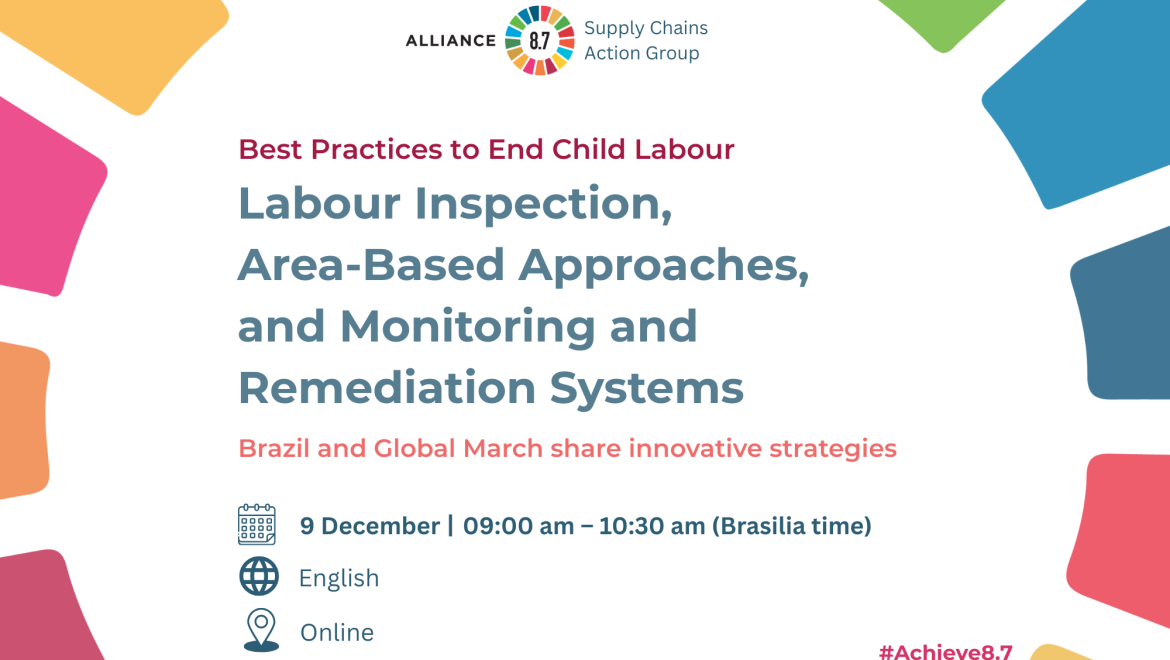Bringing together Brazil’s experience with the Special Mobile Inspection Group for Child Labor GMTI and Global March’s work on area-based and monitoring approaches, this session aims to contribute to a renewed global momentum to address child labour. It showcases transformative best practices that integrate data, community ownership, decent work and policy action.
Moderator: Maíra Lacerda, Head of International Relations, Ministry of Labour of Brazil (TBC)
Speakers:
- Brazil: Roberto Padilha Guimarães and Ana Lugica Leite Campos, Labour Inspectors, Ministry of Labour
- Global March: Gazal Malik
Language: English
Organizers: Ministry of Labour of Brazil and Global March Against Child Labour
📌 Join the workshop here.
Overview
Brazil will present the Special Mobile Inspection Group for Child Labor (GMTI) which presents itself as one of the most important current strategies of the Brazilian Labor Inspection in the fight against child labor. Conceived from the combination of repressive action with intersectoral articulation and social dialogue, the GMTI operates throughout the national territory in areas of child labor with greater technical, operational, or socioeconomic complexity, mainly in activities classified among the worst forms of child labor.
Based on diagnostics, studies, and surveys, the GMTI has acted with strategic planning, fiscal intelligence, and specialized action protocols to inspect the largest number of companies in the Textile and Footwear Sector, removing dozens of children and adolescents from child labor in these economic segments.
In addition to holding companies that exploit child labor accountable and settling the labor rights owed to these child laborers, the GMTI articulates the child and adolescent protection network to prevent the return to child labor and promote the comprehensive protection of children and adolescents, through inclusion in public policies for social protection, health, education, culture, sports, and, for adolescents aged 14 and over, professional apprenticeship programs.
Among the differentiators of the GMTI are the strategies and methodologies adopted to ensure that the fight against child labor generates impacts beyond the companies directly inspected, either through dialogue with employers' and workers' unions or by sending hundreds of collective guidance notifications addressed to companies that manufacture clothing or footwear in the region. These initiatives seek, based on the reality of the child labor found, to advise companies in the suplly chain of Textile and Footwear Sector in Brazil on the legal prohibition of child labor, the consequences of violating these legal provisions, and the risks and damages of these jobs to the health and development of children and adolescents.
Global March will highlight that despite global commitments, the world has missed the SDG 8.7 target of eliminating child labour by 2025, calling for renewed urgency and innovation in our collective response. While many countries continue to struggle with systemic barriers, there is growing recognition that isolated interventions are insufficient. Instead, comprehensive and community-rooted approaches that combine monitoring, remediation, and social protection are essential to drive lasting change.
In this context, alongside the Brazilian Ministry of Labour, the Global March Against Child Labour will present complementary insights from its long-standing work promoting Area-Based Approaches (ABA) and Child Labour Monitoring and Remediation Systems (CLMRS) across multiple regions. CLMRS and ABA offer practical, scalable, and participatory frameworks that help identify children in or at risk of child labour, link them to services, and monitor their sustained reintegration into school and community life along with addressing the root causes of child labour.
Global March’s intervention will focus on positioning CLMRS and ABA as critical tools in reinvigorating progress toward SDG 8.7. It will outline the minimum standards that define effective monitoring and remediation systems, from data verification and referral mechanisms to follow-up and reintegration support while underlining the importance of alignment with national action plans, decent work and social protection frameworks. It will also highlight the crucial role of Alliance 8.7 in mobilising Pathfinder countries to adopt and adapt such systems, fostering knowledge exchange, and investing in capacity-building initiatives that can help governments and social partners scale up proven models. The session will further reflect on the shared responsibility of governments and the private sector in implementing these systems. Furthermore, we will discuss how the collaboration between CSOs, unions and the private sector can strengthen a CLMRS.
By bringing together Brazil’s experience with GMTI and Global March’s work on area-based and monitoring approaches, the session aims to contribute to a renewed global momentum to address child labour. It will encourage member states and partners to see ABA and CLMRS as transformative best practices that integrate data, community ownership, decent work and policy action to to address child labour effectively.
